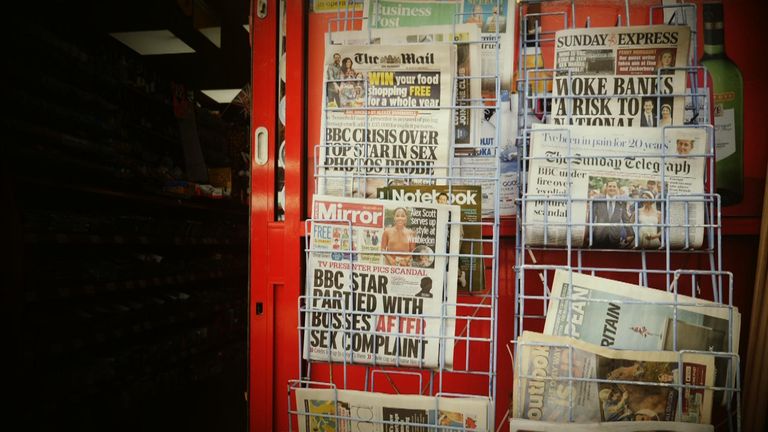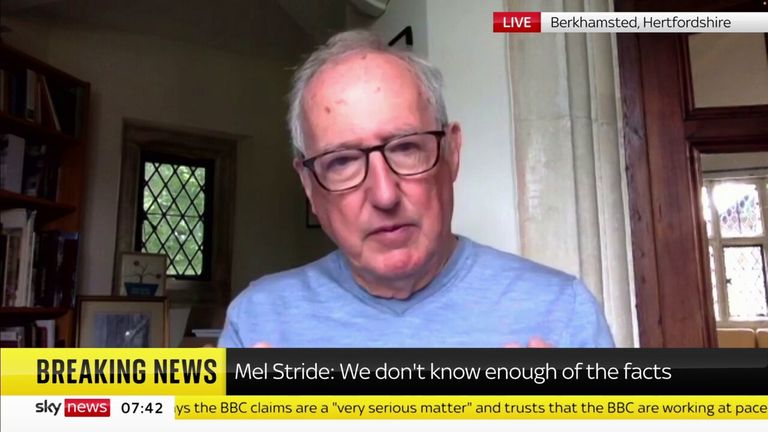Suspended BBC presenter should not be named using parliamentary privilege, cabinet minister urges MPs | Politics News
A cabinet minister has cautioned MPs against using parliamentary privilege to name the BBC presenter who has been suspended over allegations he paid a teenager for sexually explicit photographs.
Work and Pensions Secretary Mel Stride told Sky’s Kay Burley the facts appeared to have changed in the last 24 hours and MPs should wait to “see where all of this lands” before the presenter is named and that “privilege… should be used sparingly”.
Speculation continues to mount about the identity of the broadcaster, whom the BBC suspended on Sunday after the claims were reported in The Sun.
It comes as the BBC’s director-general Tim Davie faces the media today as the controversy over the top presenter deepens.
A number of high-profile presenters at the BBC – including 5 Live’s Nicky Campbell, Eurovision’s Rylan and Top Gear’s Paddy McGuinness – have all been forced to publicly deny they are the one who has been suspended after social media users named them online.
Parents of young person ‘stand by account’ – BBC presenter latest
There have been growing calls for the accused presenter to name themselves to prevent the spotlight wrongfully falling on other colleagues, while the Daily Mail reported that some MPs are considering naming the individual concerned.
Parliamentary privilege is a right granted to MPs that allows them to speak freely in the Commons chamber without being subject to laws around slander.
Asked by Sky News’ Kay Burley whether the presenter should be named, Mr Stride said: “Those decisions have to be taken on the known facts. And it seems to me that even the apparent known facts seem to be changing within 24 hours.”
Pressed on whether he would “implore” his colleagues not to name the presenter using parliamentary privilege, Mr Stride replied: “I can only speak for myself – that’s a very personal thing.
“I would personally certainly not be doing that.
“Members of parliament do have a right to privilege and to be able to say things in the Commons without fear of legal repercussions.
“But I think that is a privilege that should be used very sparingly and with great thought.
“I would want to see process continue here as quickly as possible. And that is what the secretary of state, media and culture, has been doing, has been pressing the BBC to do that.
“I’m as confident I can be that they will be now moving at pace. I think we have to see where all of this lands and then start to make these judgements about whether things were done the right way or not, whether people should be named or not, and so on and so forth.”
Mr Stride’s comments come as Mr Davie prepares to speak to journalists about the broadcaster’s annual report, which is set to reveal how much its biggest stars are paid.
The story took a further development on Monday night after the young person at the centre of the controversy released a statement to the BBC saying that nothing inappropriate or unlawful happened, while also describing allegations made by The Sun as “rubbish”.
Their lawyer added that the 20-year-old is estranged from their mother and stepfather, who made the claims to the newspaper.
In response, the young person’s mother told The Sun she stood by her claims and said the presenter had “got into their head”. She also questioned how they were able to afford legal representation.
Read more:
Why hasn’t the BBC presenter at the centre of the allegations been named publicly?
BBC presenter scandal is sleazy and depressing – but at the heart of this a family is suffering
Mr Stride’s warnings to MPs were also echoed by Labour’s shadow work and pensions secretary Jonathan Ashworth, who also said he “wouldn’t name him”.
“I know it’s certainly a very sensitive and difficult story for the BBC,” he told Sky News.
“Developments overnight suggest there are some complications and disputes in versions of events.
“I think the most important thing is that this is thoroughly investigated, the BBC look into this all properly and they should be allowed to get on with that.
“I don’t think it’s helpful for politicians to be offering a running commentary or making statements in the House of Commons about who this person might be or not be.”


